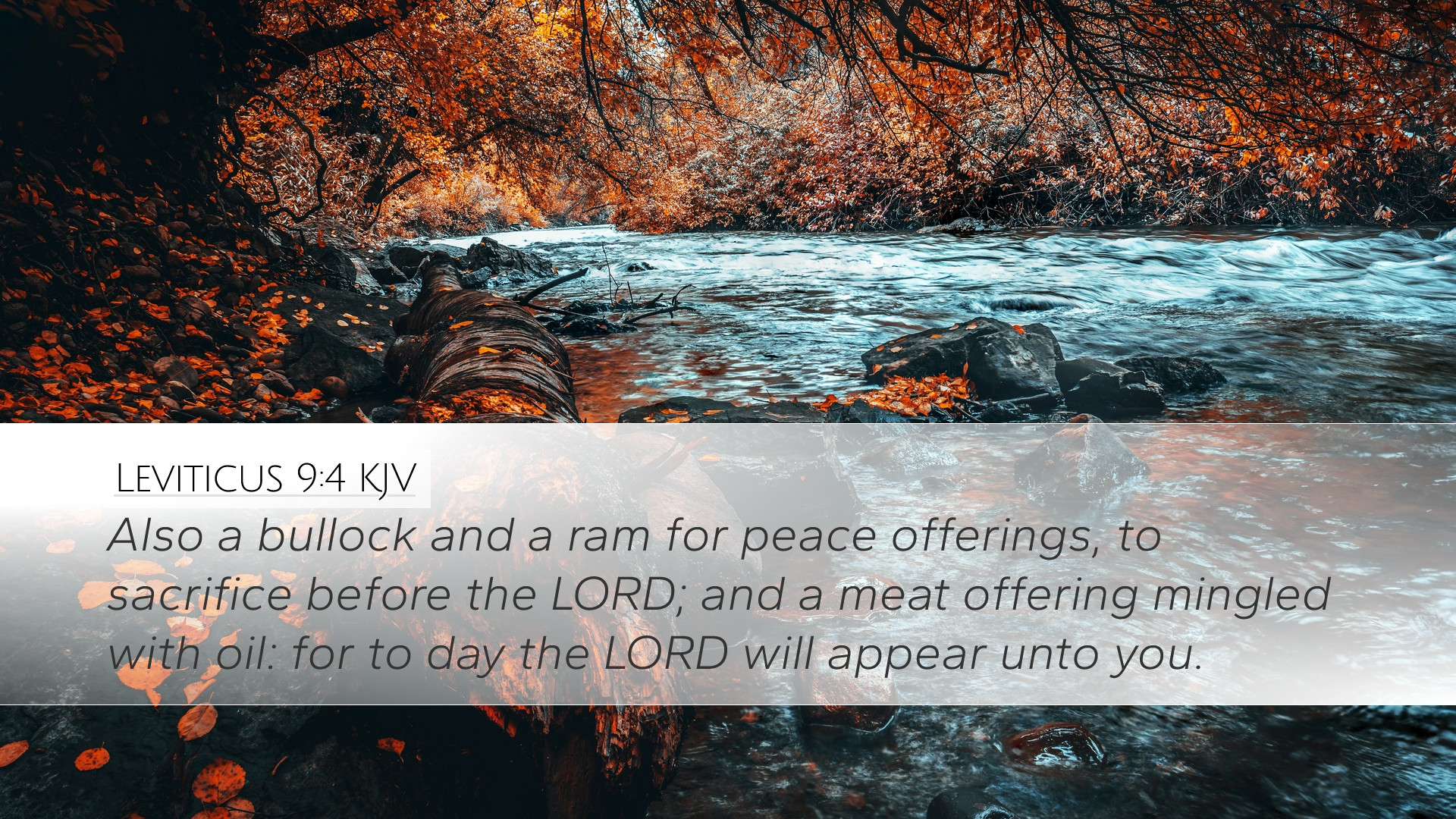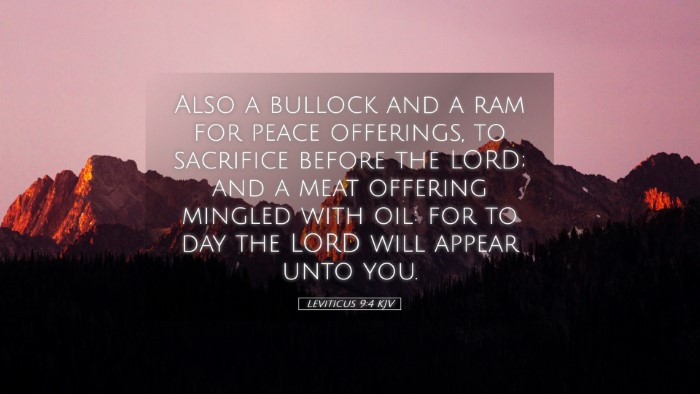Commentary on Leviticus 9:4
Verse: Leviticus 9:4 - "Also a bullock and a ram for peace offerings, to sacrifice before the LORD; and a meat offering mingled with oil: for today the LORD will appear unto you."
Introduction
Leviticus 9 marks a crucial moment in the narrative of the Israelite worship as it details the inaugural offerings of Aaron and his sons as they begin their priestly service in the newly constructed Tabernacle.
This verse encapsulates the significance of sacrificial rites and the profound moment when the presence of God is promised to His people. Various themes arise from this passage, including the nature of offerings, the importance of divine encounters, and the prescribed ceremonial systems.
Exegesis of Leviticus 9:4
The components of the offerings specified in this verse—the bullock and ram for peace offerings, and the accompanying meat offering—reflect the multilayered significance of sacrifices in Old Testament worship.
Each offering has unique purposes and theological implications which allow us to understand God's relationship with His people.
1. The Context of Sacrifice
As stated by Matthew Henry, sacrifices in the Levitical system were not arbitrary. They were ordained by God as means for atonement and communion with Him.
In this case, the peace offerings signify a restoration of fellowship between God and His people, binding them together in covenant relationship.
Albert Barnes emphasizes that the peace offering, or "shelami," denotes well-being and completeness, indicating that these sacrifices were meant to maintain harmony within the community as well as with God.
2. The Symbolism of Offerings
Each component of the offerings holds rich symbolism:
-
Bullock: Often signifies strength and serves as an acknowledgement of sin and need for atonement. As Adam Clarke notes, this larger animal reflects the gravity with which sin ought to be approached.
-
Ram: Represents consecration and devotion to God, affirming one's commitment to live righteously. As noted by Barnes, this offering expresses gratitude and the willingness to fulfill God's commands.
-
Meat Offering: This is a grain offering, which signifies the worshiper's acknowledgment of God's provision and blessings. Henry indicates that mingling the offering with oil symbolizes the Holy Spirit's presence, emphasizing the divine empowerment in worship.
3. The Importance of Divine Encounter
The phrase "for today the LORD will appear unto you" is pivotal. This denotes not only the acceptance of the offerings but also an extraordinary moment of divine revelation.
Matthew Henry points out that this assurance speaks to the anticipation of meeting with the Lord, and it sets a precedent for future worship ceremonies.
It reinforces the idea that genuine worship leads to tangible encounters with God, highlighting the ongoing relationship God desires with His people.
Theological Implications
1. The Role of the Priesthood
This event underscores the importance of the priestly role established in Leviticus.
Albert Barnes emphasizes that Aaron's priestly duties are foundational, establishing the significance of mediators between God and humanity.
The priest serves as a channel for divine grace, and this ceremony marked the beginning of a deeper communal worship experience.
2. God's Desire for Fellowship
The offerings presented are about creating a space for fellowship with God.
Adam Clarke explains that God desires sincerity and intentionality from His followers, which is reflected in the heart of the offerings.
This mirrors the New Testament understanding of sacrifice, where the ultimate act of atonement is fulfilled in Christ, bridging the gap between God and humanity.
3. Instruction for Modern Worship
For pastors and theologians today, Leviticus 9:4 serves as a profound reminder of the necessity of approaching worship with intention and reverence.
As Matthew Henry suggests, worship should be grounded in the understanding of what is owed to God—both in our hearts and our offerings.
This passage invites contemporary believers to consider how they prepare for encounters with God and the transformative power of sincere worship.
Conclusion
Leviticus 9:4 encapsulates historical and theological truths that resonate through centuries, emphasizing the continuity of God's desire for relational worship through sacrificial practice.
The insights drawn from Matthew Henry, Albert Barnes, and Adam Clarke highlight the eternal truths within the text, providing essential guidance for ministry and personal faith.
In recognizing the weight of these offerings, modern believers are challenged to cultivate a deeper understanding of their own worship practices and the divine presence that accompanies them.


